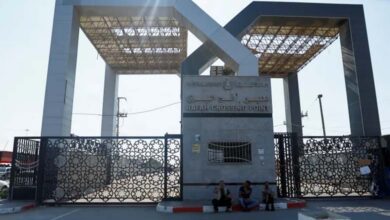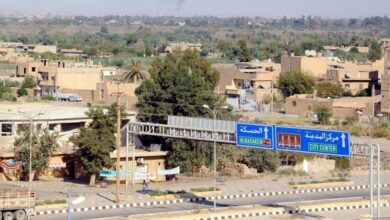Houthis reduce international aid for public employees… Why?

Employees of government institutions and departments in the Yemeni capital, Sanaa, and the areas controlled by the Houthi rebels were surprised to reduce the quantity and size of food baskets provided by the United Nations relief agencies. Many of them were deprived of these baskets, while the families of those killed and injured by the rebels received millions of dollars in aid.
This coincides with the coup plotters implementing Ramadan projects worth 7 billion riyals ($560) to provide aid to the families of those killed and wounded in the war. The so-called “monthly sponsorship” of these families paid money to 51,000 families, according to the group’s media.
According to Middle East newspaper, a number of beneficiaries of food baskets in the capital Sanaa said that what is known as the Supreme Council for the Management and Coordination of Humanitarian Affairs and International Cooperation, a new Houthi entity, distributed only flour sacks to them. The food baskets provided by the World Food Program contained various consumables, such as oil, sugar, types of beans and cans, in addition to flour.
Several other beneficiaries accused the Houthis of selling food basket ingredients in the markets at prices higher than those available in the Yemeni markets, noting that these Houthi measures took place in parallel with the World Food Program’s reduction in the quantity and size of food baskets, which were offered every three months, according to the newspaper.
Beneficiaries of the food baskets have asked WFP officials to come to the markets themselves to investigate the fact that Houthi militias are selling their dues from WFP aid to those affected by the militias’ humanitarian crisis.
Two months ago, the World Food Program (WFP) began reducing the size of basket ingredients for public officials, with flour reduced from 75 kilograms to 50 kilograms and, instead of 8 liters of oil and 10 kilograms of legumes, reduced by half, with salt and sugar remaining the same, by just one kilogram.
Food baskets provided by aid agencies and UN agencies are one of the most important means of mitigating the effects of the humanitarian crisis on Yemeni families, especially those whose breadwinners have lost their sources of income or lost their salaries.
The Houthi group uses food baskets to blackmail residents in areas under its control, and requires them to pay their sons, especially children and youth, to fight in its ranks in return for food aid from international bodies or to respond to its demands and orders.
Last November, the Houthis stopped food baskets meant for public officials from refusing to sign the group’s “Code of Conduct,” which the group had approved the same month and included a declaration of loyalty to it, its leaders, and its project.












